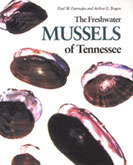The Freshwater Mussels of Tennessee

- Author(s): Parmalee, Paul W., and Arthur E. Bogan
- Series:
- Imprint: Univ Tennessee Press
- Publication Date: 1998-12-24
- Status: Active
- Available in Hardcover - Cloth: Price $52.00 | Buy Now
- Leaf eReader required for PDF ebooks
“The Freshwater Mussels of Tennessee . . . is indispensable to anyone, anywhere, working on this group. Parmalee and Bogan have written a work that sets the standard for future regional guides.”—G. Thomas Watters, Ohio Biological Survey
“The Freshwater Mussels of Tennessee documents a tremendously diverse and unique mussel fauna that is rapidly being destroyed by modern development. Parmalee and Bogan set a new standard for state mussel surveys in their authoritative, thorough, and and highly readable account. The book will be of interest to biologists and conservationists worldwide and will appeal to anyone who cares about the preservation of natural resources in the southeastern United States.”—Robert E. Warren, Illinois State Museum
With more than 150 species and subspecies recorded in the state, Tennessee has one of the most diverse freshwater mussel faunas in North America. Valuable as indicators of water quality, these mollusks have themselves become threatened as development encroaches on habitat—twenty-three are currently listed as endangered species and at least twelve have become extinct.
This is the first book for Tennessee to deal with this biologically and commercially significant group of mollusks. Its authors have been studying and writing about the mussels of Tennessee for more than twenty years and have undertaken a systematic organization of a large and complex body of information to bring order to a difficult field.
The book traces the long history of human exploitation of mussels, from aboriginal food gathering to the growth of the cultured pearl industry. It provides an interpretive context for its exhaustive species accounts with background material on biology, distribution, economic utilization, taxonomy, and conservation issues. The authors also review the life cycle of the mussel and describe its many remarkable traits, such as its shell formation and the strategies it employs during the larval stage in parasitizing fish.
The species accounts comprise 128 members of Family Unionidae—from pigtoes and pocketbooks to lilliputs and spikes—plus four additional species. The authors cover classification and synonymy, range and distribution, life history and ecology, and survival status. Particular attention is paid to shell description and structure to assist the reader in identification. Each species account includes a distribution map and color photos of two specimens.
The Freshwater Mussels of Tennessee is a major reference that encompasses historical and modern mussel collections and draws on conservation studies that span two centuries. It will stand as an authoritative guide to understanding Tennessee mollusks and as a benchmark in the study of these species worldwide.
Paul W. Parmalee is professor emeritus of zooarchaeology and director emeritus of the McClung Museum at the University of Tennessee, Knoxville.
Arthur E. Bogan is curator of aquatic invertebrates at the NorthCarolina State Museum of Natural Sciences, Raleigh.
